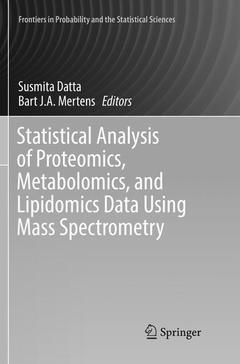Statistical Analysis of Proteomics, Metabolomics, and Lipidomics Data Using Mass Spectrometry, Softcover reprint of the original 1st ed. 2017 Frontiers in Probability and the Statistical Sciences Series

This book presents an overview of computational and statistical design and analysis of mass spectrometry-based proteomics, metabolomics, and lipidomics data. This contributed volume provides an introduction to the special aspects of statistical design and analysis with mass spectrometry data for the new omic sciences. The text discusses common aspects of design and analysis between and across all (or most) forms of mass spectrometry, while also providing special examples of application with the most common forms of mass spectrometry. Also covered are applications of computational mass spectrometry not only in clinical study but also in the interpretation of omics data in plant biology studies.
Omics research fields are expected to revolutionize biomolecular research by the ability to simultaneously profile many compounds within either patient blood, urine, tissue, or other biological samples. Mass spectrometry is one of the key analytical techniques used in these new omic sciences. Liquid chromatography mass spectrometry, time-of-flight data, and Fourier transform mass spectrometry are but a selection of the measurement platforms available to the modern analyst. Thus in practical proteomics or metabolomics, researchers will not only be confronted with new high dimensional data types?as opposed to the familiar data structures in more classical genomics?but also with great variation between distinct types of mass spectral measurements derived from different platforms, which may complicate analyses, comparison, and interpretation of results.
Transformation, normalization and batch effect in the analysis of mass spectrometry data for omics studies.- Automated Alignment of Mass Spectrometry Data Using Functional Geometry.- The analysis of peptide-centric mass spectrometry data utilizing information about the expected isotope distribution.- Probabilistic and likelihood-based methods for protein identification from MS/MS data.- An MCMC-MRF Algorithm for Incorporating Spatial Information in IMS Data Processing.- Mass Spectrometry Analysis Using MALDIquant.- Model-based analysis of quantitative proteomics data with data independent acquisition mass spectrometry.- The analysis of human serum albumin proteoforms using compositional framework.- Variability Assessment of Label-Free LC-MS Experiments for Difference Detection.- Statistical approach for biomarker discovery using label-free LC-MS data - an overview.- Bayesian posterior integration for classification ofmass spectrometry data.- Logistic regression modeling on mass spectrometry data in proteomics case-control discriminant studies.- Robust and confident predictor selection in metabolomics.- On the combination of omics data for prediction of binary Outcomes.- Statistical analysis of lipidomics data in a case-control study.
Susmita Datta received her PhD in statistics from the University of Georgia. She is a tenured professor in the Department of Biostatistics at the University of Florida. Before joining the University of Florida she was a professor in the Department of Bioinformatics and Biostatistics and a distinguished university scholar at the University of Louisville. She is a Fellow of the American Association for the Advancement of Science (AAAS), American Statistical Association (ASA), and an elected member of the International Statistical Institute (ISI). Her research interests include bioinformatics, genomics, proteomics, clustering and classification techniques, infectious disease modeling, statistical issues in population biology, systems biology, survival analysis, and multi state models. She is past president of the Caucus for Women in Statistics, and she actively supports research and education for women in STEM fields.
Bart Mertens received his PhD in statistical sciences from University College London, Department of Statistical Sciences, on statistical analysis methods for spectrometry data. He is currently Associate Professor at the Department of Medical Statistics and Bioinformatics of the Leiden University Medical Centre, where he has been working in both research and consulting for statistical analysis methodology with mass spectrometry proteomic data for more than 10 years.
Date de parution : 07-2018
Ouvrage de 295 p.
15.5x23.5 cm
Date de parution : 12-2016
Ouvrage de 295 p.
15.5x23.5 cm



